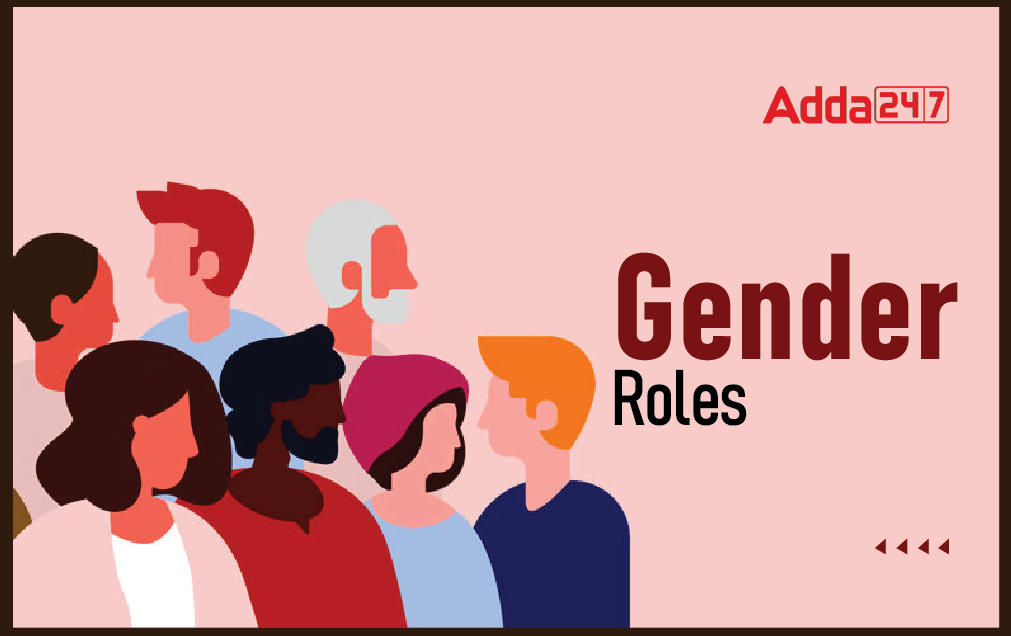Table of Contents
Gender Roles are the behaviors men and women plays in society. These behavious shows their works and mental thoughts which become generalized. Here we are going to learn Gender and its roles in detail. We are also going to explain Gender Roles and factor affecting gender roles and their nature.
Gender Roles
लैंगिक भूमिकाएं
GENDER (लिंग)
- The word ‘gender’ comes from Latin word ‘genus’, which means kind or race.’लिंग’ शब्द लैटिन शब्द ‘जीनस’ से आया है, जिसका अर्थ है दयालु या नस्ल
- Gender is a psychological and cultural term referring to one’s subjective feelings of maleness and femaleness.लिंग एक मनोवैज्ञानिक और सांस्कृतिक शब्द है, जो दुर्भावना और नारीत्व की व्यक्तिपरक भावनाओं का उल्लेख करता है
- Gender may also refer to society’s evaluation of behaviour as masculine or feminine.
- The social and cultural definitions of men and women are called gender. For example, it is society that makes rules that a girl will stay in the house, while a boy can go out or that a girl be given less food to eat and less time to play than a boy. A boy should be sent to a better school, so that when he grows up, he can look after the family business or get a good job, while not much attention is paid to a girl’s education. Due to these social definitions, the differences between girls and boys creates two different worlds.पुरुषों और महिलाओं की सामाजिक और सांस्कृतिक परिभाषाओं को लिंग कहा जाता है। उदाहरण के लिए, यह समाज है जो नियम बनाता है कि एक लड़की घर में रहेगी, जबकि एक लड़का बाहर जा सकता है या एक लड़की को खाने के लिए कम खाना दिया जाता है और एक लड़के को खेलने के लिए कम समय दिया जाता है। एक लड़के को एक बेहतर स्कूल में भेजा जाना चाहिए, ताकि जब वह बड़ा हो जाए, तो वह परिवार के व्यवसाय की देखरेख कर सके या अच्छी नौकरी पा सके, जबकि लड़की की शिक्षा पर ज्यादा ध्यान नहीं दिया जाता है। इन सामाजिक परिभाषाओं के कारण, लड़कियों और लड़कों के बीच अंतर दो अलग-अलग दुनिया बनाता है
GENDER ROLES (लैंगिक भूमिकाएं)
Meaning (अर्थ)
A gender role, also known as sex role, is a social role encompassing a range of behaviours and attitudes that are generally considered acceptable, appropriate or desirable for people based on their actual or perceived sex. Gender roles are usually centred on conceptions of feminity and masculinity although there are exceptions and variations. The specifics regarding these gendered exceptions may vary substantially among cultures, while other characteristics may be common throughout a range of cultures.
एक लिंग भूमिका, जिसे सेक्स भूमिका के रूप में भी जाना जाता है, एक सामाजिक भूमिका है जो व्यवहार और दृष्टिकोण की एक सीमा को शामिल करती है जिसे आमतौर पर उनके वास्तविक या कथित सेक्स के आधार पर लोगों के लिए स्वीकार्य, उचित या वांछनीय माना जाता है। लिंग भूमिकाएं आमतौर पर स्त्रीत्व और पुरुषत्व की अवधारणाओं पर केंद्रित होती हैं, हालांकि अपवाद और विविधताएं हैं। इन लिंग अपवादों के बारे में विशिष्टताएँ संस्कृतियों के बीच पर्याप्त रूप से भिन्न हो सकती हैं, जबकि अन्य विशेषताओं में संस्कृतियों की एक सीमा हो सकती है
Definitions (परिभाषाएं)
- The World Health Organisation describes gender roles as “Socially constructed roles, behaviors and activities and attributes that a given society considers appropriate for men and women”.विश्व स्वास्थ्य संगठन लैंगिक भूमिकाओं को सामाजिक रूप से निर्मित भूमिकाओं, व्यवहारों और गतिविधियों और विशेषताओं के रूप में वर्णित करता है जो एक समाज पुरुषों और महिलाओं के लिए उपयुक्त मानता है
- Block (1973) stated, “Gender role is a constellation of qualities an individual understands to characterize males and females in his or her culture. These qualities include activities, role relations, social position, personality characteristics and a host of abilities and behaviors”.ब्लॉक (1973) द्वारा कहा गया है, “लिंग भूमिका उन गुणों का एक नक्षत्र है जो एक व्यक्ति अपनी संस्कृति में पुरुषों और महिलाओं की विशेषता को समझता है। इन गुणों में गतिविधियों, भूमिका संबंध, सामाजिक स्थिति, व्यक्तित्व विशेषताओं और क्षमताओं और व्यवहारों के एक मेजबान शामिल हैं”.
- Gender roles in society means how we are expected to act, speak, dress, groom, and conduct ourselves based upon our assigned sex. For example, girls and women are generally expected to dress in typically feminine ways and be polite, accommodating, and nurturing. Men are generally expected to be strong, aggressive, and bold. This is generally the set of roles, activities, expectations, and behaviours assigned to females and males by society.समाज में लैंगिक भूमिकाओं का अर्थ है कि हमें अपने निर्धारित लिंग के आधार पर अभिनय करने, बोलने, पहनने, तैयार होने और खुद से आचरण करने की अपेक्षा की जाती है। उदाहरण के लिए, लड़कियों और महिलाओं को आम तौर पर स्त्रियोचित तरीकों से कपड़े पहनने और विनम्र, मिलनसार और पोषण करने की उम्मीद की जाती है। पुरुषों से आमतौर पर मजबूत, आक्रामक और बोल्ड होने की उम्मीद की जाती है। यह आमतौर पर समाज द्वारा महिलाओं और पुरुषों को सौंपी गई भूमिकाओं, गतिविधियों, अपेक्षाओं और व्यवहारों का समूह है.
Our culture recognises two basic gender roles:
हमारी संस्कृति दो मूल लिंग भूमिकाओं को पहचानती है:
- Masculine (having the qualities attributed to males); and पुलिंग (पुरुषों के गुण); तथा
- Feminine (having the qualities attributed to females). स्त्रीलिंग (स्त्रीओं के गुण);
Nature of Gender Roles/लिंग भूमिकाओं की प्रकृति
- Gender roles are learned behaviour.लिंग भूमिकाएं सीखा गया व्यवहार है।
- These roles vary in their social, economic, and political dimension across cultures. Values and norms differ widely from culture- to- culture.ये भूमिकाएँ संस्कृतियों में उनके सामाजिक, आर्थिक और राजनीतिक आयाम में भिन्न होती हैं। मूल्य और मानदंड संस्कृति से संस्कृति में व्यापक रूप से भिन्न हैं।
- Gender roles have certain universality, but are largely culturally determined.लिंग भूमिकाओं में कुछ सार्वभौमिकता होती है, लेकिन बड़े पैमाने पर सांस्कृतिक रूप से निर्धारित होती हैं।
- Gender roles are affected by a number of factors such as age, class, race, ethnicity, religion and ideologies, in addition to geographical, economic, and political environment.भौगोलिक, आर्थिक और राजनीतिक वातावरण के अलावा, उम्र, वर्ग, नस्ल, धर्म और विचारधारा जैसे कई कारकों से लिंग की भूमिका प्रभावित होती है।
- Roles may be complementary or conflicting.भूमिकाएँ पूरक या परस्पर विरोधी हो सकती हैं
Factors Determining Gender Roles/Stereotypes/लैंगिक भूमिका / रूढ़ि का निर्धारण करने वाले कारक
- Personality Traits –Women are often expected to be accommodating and emotional, while men are expected to be self-confident and aggressive.व्यक्तित्व लक्षण: महिलाओं को अक्सर मिलनसार और भावनात्मक होने की उम्मीद की जाती है, जबकि पुरुषों को आत्मविश्वास और आक्रामक होने की उम्मीद की जाती है
- Domestic Behaviours –Some people expect that women will take care of the children, cook, and clean the home, while men take care of finances, work on the car, and do the home repairs.घरेलू व्यवहार: कुछ लोग उम्मीद करते हैं कि महिलाएं बच्चों की देखभाल, खाना बनाना और घर की सफाई करेंगी, जबकि पुरुष वित्त का ध्यान रखते हैं, कार पर काम करते हैं और घर की मरम्मत करते हैं।
- Occupations – Some people are quick to assume that teachers and nurses are women, and that pilots, doctors, and engineers are men.व्यवसाय: कुछ लोग यह मान लेते हैं कि शिक्षक और नर्स महिला हैं और पायलट, डॉक्टर और इंजीनियर पुरुष हैं।
- Physical Appearance –Women are expected to be thin and graceful, while men are expected to be tall and muscular. Men and women are also expected to dress and groom in ways that are stereotypical to their gender (men wearing pants and short hairstyles, women wearing dresses and makeup)शारीरिक रूप: महिलाओं के पतले और सुडौल होने की उम्मीद की जाती है, जबकि पुरुषों के लंबे और मांसल होने की उम्मीद की जाती है। पुरुषों और महिलाओं को उन तरीकों से कपड़े और दूल्हे के लिए भी उम्मीद की जाती है जो उनके लिंग के लिए रूढ़िवादी हैं (पुरुषों ने पैंट और लघु केशविन्यास, कपड़े और श्रृंगार पहनने वाली महिलाएं)।




 KTET Previous Year Question Papers PDF D...
KTET Previous Year Question Papers PDF D...
 KTET Preparation Tips 2025, Online Prepa...
KTET Preparation Tips 2025, Online Prepa...
 DSSSB Teacher Salary in Hand For TGT PGT...
DSSSB Teacher Salary in Hand For TGT PGT...




